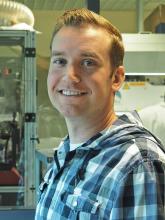
Where did you do your Fulbright and what was the purpose of the Study Grant?
I did my Fulbright fellowship in Krakow Poland at AGH University of Science and Technology. I worked in the department of Metals Engineering and Industrial Computer Science studying the wetting properties of electrospun polymers for water harvesting applications. The objective of my research was to develop and study nano-fibrous materials that capture drinking water from humid air.
How did you engage with the local people?
Living on a college campus in a relatively large city, I had many opportunities to engage with the local community. I am involved in the city running organization and participate in the Krakow Parkrun competition, in which I have met many local people and received great suggestions for running trails through out the city. I am in a Polish language course, where I interact with people from all over the world who have recently moved to Poland and are also struggling to learn the local language. This has given me the tools and the confidence to communicate in Polish when going out to restaurants, shopping on the weekends, or cheering for the national Polish soccer team during the world cup.
What surprised you the most?
The most surprising thing for me was the fantastic network of help I received while in Poland. I anticipated being by myself in a country that I do not know anyone in and assumed it would feel alienated. However, all my colleagues were immediately so friendly and persistent in finding activities like sightseeing and hiking for me to do with everyone. Additionally, there were other Fulbrighters in Krakow who were always available to hangout and explore new sights on the weekends. In a very short amount of time, I had made many connections with people in multiple cities through out Poland, which gave me a chance to explore other cities as well.
How did you prepare in the year/months prior to the departure?
Once I received the news that I was awarded the Fulbright fellowship, I immediately downloaded language learning apps and started watching Youtube videos about Polish history, culture, and geography. The months leading up to my departure, involved a lot of logistical planning, like obtaining a Polish visa and finding a place to live in Krakow. I also spoke with my research group in Poland prior to arriving to make sure I would be able to order all materials and equipment that I might need to expedite the research process and make sure I did not waste time in the beginning of my fellowship waiting for supplies.
How were you received as an American?
Everyone has gotten very excited when they found out that I am American. There are not too many students from the USA at the university and I am the first researcher in the department from the USA. All my colleagues were thrilled to practice English with a native speaker and ask many questions about current events that they read in the news daily about the USA.
What advice to you have for students considering applying?
My advice for applying is to make sure you get as much help as possible. The application process is long and finding a host institution and affiliation letter can be time consuming. Talking to previous Fulbright grantees or people that were familiar with the Fulbright process was very helpful to me. Many professors at RPI are willing to help with the application process, read over personal statements, grant proposals, and perform mock interviews. Betty helped with every aspect of the application process and made sure my application was as good as it could be. Make sure to start early that way when it is finally time to submit the application you are confident about applying and don’t have to worry about last minute issues.
The Fulbright U.S. Student Program provides year-long awards for research, study, or English Teaching Assistant positions abroad.
